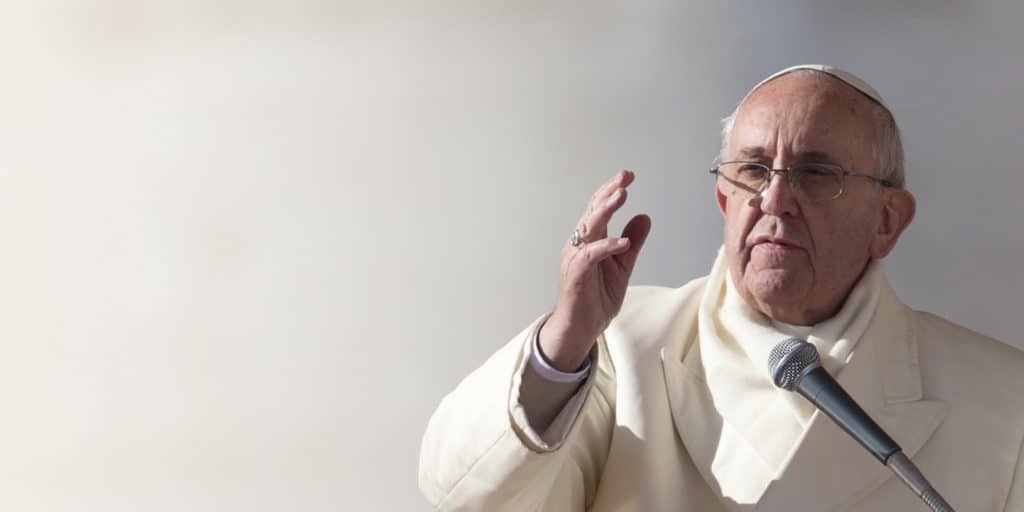
We are pleased to share with you this unsolicited guest blog post from Bob E. Ulanowicz, an American theoretical ecologist and philosopher.
The recent media flurry over Pope Francis’ Encyclical on the environment, Laudato Si’, appears to have missed his major thrust, which happens to connect strongly with Regenerative Capitalism. Most reviews highlight Francis’ concern about global warming or his Integral Ecology – the manifold connections between the natural world, economics, society, and politics. Yet, while attention to such relationships is laudable, this focus has already received considerable notice in the academic and professional literature. Other analysts point to his critique of unfettered capitalism, yet this too is nothing new – Catholic Social Teaching has criticized unrestrained capitalism since Pope Leo XIII’s Rerum Novarum in 1891.
Instead, the radical thrust of this document relates strongly to Jorge Bergoglio’s choice of name as Bishop of Rome – Francis, as in St. Francis of Assisi, the Saint who championed the poor and outcast, and preached that poverty often was the road to deepest spirituality. Pope Francis channels the Saint in his opening section, citing Francis’ “refusal to turn reality into an object simply to be used and controlled” [paragraph 11] and relates how Francis always made sure that a part of the friary garden was to be left to God’s plants and creatures. He shows his awareness of the complex ties between the health of the natural and human worlds and the workings of finance and monetary policy by noting that “whatever is fragile, like the environment, is defenseless before the interests of a deified market, which becomes the only rule” [56], adding that the “Economic and financial sectors, being transitional, tend to prevail over the political” [175]. He argues that the “undifferentiated and one-dimensional paradigm” [106] of economics in which “the maximization of profits … reflects a misunderstanding of the very concept of the economy” [195]. He regrets that “Finance overwhelms the real economy” [109] – these days by a factor greater than 50:1[1]. Yet, Pope Francis reveals his hand most openly in Chapter 5 when he makes what might be his most counter-cultural statement:
“In any discussion about a proposed venture, a number of questions need to be asked in order to discern whether or not it will contribute to genuine integral development. What will it accomplish? Why? Where? When? How? For whom? What are the risks? What are the costs? Who will pay those costs and how?” [185].
Such questions about who benefits and who pays also tie into Regenerative Economics’ concern about externalities, and to ecological economist Herman Daly’s condemnation of “growism.” Nowadays, if a shopping center is proposed, the guiding issue is whether the project will achieve a high return to the developer – i.e., high “growth” – all other matters become secondary. In contrast, Francis states that, “a decrease in the pace of production and consumption can at times give rise to another form of progress and development” [191]. He cautions we must “contain growth by setting some reasonable limits and even retracing our steps before it is too late” [193]. Francis is confident of the need for such slow-down, writing, “the present world system is certainly unsustainable from a number of points of view” [61] and we must “leave behind the myth of unlimited material progress” [78].
These Franciscan prescriptions also speak to regenerative economics emphasis on balance. For example, studies of energy and currency flows in healthy systems show that pursuit of ever greater efficiency and growth pulls the system away from a healthy balance, and heightens the probability of collapse. In contrast, healthy systems maintain a balance between “throughput efficiency” – akin to the kind that fuels economic size and growth – and a diversity that allows for resilience in the face of perturbation. Translated into economics, processes that decrease market efficiency somewhat in order to permit the survival of slightly less-efficient actors may actually improve the system’s overall sustainability.
Studying such dynamics might also clarify how, in a world of very finite resources, to reconfigure economics to achieve a more just apportionment among the “universal destination of goods” [93]. For example, studies of natural systems also tell us that balance is improved by shorter, quicker, lower-level feedback loops – the kind found in well-knit “cooperatives,” in a sense. In contrast, today’s massive corporate structures tend to crush smaller, quicker ventures as soon as they begin to succeed, as happened with the Saturn experiment under GM.
It’s also of note that the balance between efficiency and resilience-enhancing diversity is related to Adam Smith’s balance between self-interest and “sympathy,” the kind produced when we connect to another person’s circumstances as our own. Smith argued that there was a close relationship between moral behavior and the maximization of virtue, and healthy economic behavior which involved the maximization of wealth as a means to a higher end. Self-interest drives wealth; sympathy drives virtue; only a combination of the two drives wealth as a means to a higher end. Regenerative Capitalism also emphasizes the need to balance self-interest and sympathy because the two play important roles in balancing efficiency and resilience. This is also what Rerum Novarum was about.
It remains for people of good will and organizations like the Capital Institute to elaborate the means for dialing back the overall amplitude of the economy without endangering fundamental human needs and dignity. Meanwhile, Francis consoles us by encouraging that we adopt an attitude of “less is more” and a spirituality marked by “the capacity to be happy with little”. [222]

